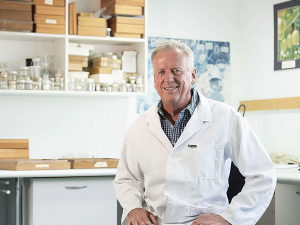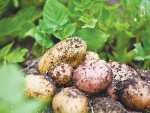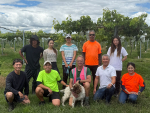A leading Plant and Food Research scientist is pleasantly surprised at how many apple trees in Hawke's Bay have recovered from the effects of Cyclone Gabrielle and other rains that hit the region this year.
Jim Walker is an expert in dealing with apple trees. He, along with a team of rural professionals from Hawke's Bay, including representatives from Apples and Pears NZ, AgFirst and others, have been busy this year working on finding solutions to get apple orchards damaged by the heavy rains back to some sort of normal.
Immediately following the cyclone, the team got together and their first task was to draw up a list of 30 orchards which represented a cross section of the different types of damage. They visited these on a regular basis to gather data that could be applied to other orchards. Despite the ongoing wet conditions, they took soil samples and started to assess what could be done.
“The challenge we faced was that no one in NZ had encountered this sort of situation before where fruit trees in the middle of harvest were exposed to such flooding, water logging and being inundated with heavy deposits of silt,” Walker told Hort News.
“We were also faced with the situation that there are a range of soil types on the Heretaunga Plains – some free draining and others not. The situation was exacerbated by the fact that after Cyclone Gabrielle the rain continued to fall.”
The big problem that Walker and the team had to face was root rot or Phytophthora, which effectively attacks and destroys the root system. The team came up with a recommendation that has probably proved to be the saviour of thousands of apple trees – a little known chemical called phosphorus acid. This acted as a stimulant to the trees and encouraged the plants’ defences to kick in.
“We recommended that growers whose trees had been waterlogged spray this on the trees,” he explains. “Some were able to do this using conventional ground spraying equipment, but in many cases the ground was too waterlogged and muddy for machines, so helicopters were used to get the spray on the damaged apples trees.”
Walker says, by and large, the same orchards that were damaged have had an excellent bloom. He says the exceptions appear to be orchards that even prior to Cyclone Gabrielle had drainage problems caused by blocked drains or the soil itself was just so waterlogged.
Walker says problems may also have occurred for orchardists who didn’t spray their trees with phosacid. However, overall, he says the problems were nowhere near as bad as was first anticipated.
“We are very surprised to see some pretty healthy trees and good fruit set at this time of the season.”
Testing Time Still Ahead
Walker says while at first glance the situation looks promising, there is still uncertainty about this year’s apple crop and those in subsequent seasons.
He notes that not everything plays out in the first season.
“Apple trees that have bloomed well are now entering a critical phase.”
Walker says for fruit to reach maturity, it needs the capacity from the root system and there is no science that can predict what might or might not happen. He adds that some trees may yet collapse this season and others may do so in subsequent seasons.
This situation still has a little time to play out for this season. In some situations, we can get 10% tree loss in a block and if that’s the case it really starts to destroy the economics of the operation,” Walker told Hort News. “If the losses are gradual, this means that potentially the decision to replant will be delayed and may prove costly.”
Despite all the ‘ifs and buts’, there is no doubt that the Flood Recovery team and growers have pulled off a miracle of sorts. The early decision to tell growers to spray with phosacid and the science on the hoof has turned what eight months ago looked like a complete disaster into a situation where there is hope and maybe more success.
Meanwhile, the research findings from Cyclone Gabrielle are being carefully documented and will likely be published in a scientific journal. Walker says there may be more events like this in NZ or overseas and the lessons from what the Hawke’s Bay Flood Response team have discovered may help others faced with similar situations.


















